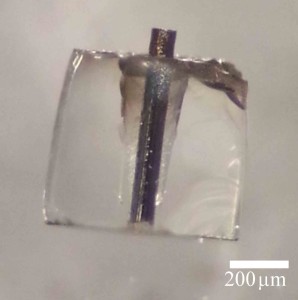Researchers from the Norwegian University of Science and Technology have developed solar cells made of silicon fibres coated in glass, which require 90% less silicon for production and can function with 1000 times less pure silicon than conventional versions.
 Image Credit: Fredrik A. Martinsen
Image Credit: Fredrik A. Martinsen
The researchers adopted a method used to produce fibre optic cables in order to manufacture the new solar cells.
They inserted a silicon core into a 30mm diameter glass tube and when heated, the glass softened and the silicon melted.
This was then stretched to form a thin glass fibre with a silicon inside. The resulting silicon core measured 100μm.
Very pure silicon is used in the conventional production of solar cells but it is expensive and requires a large amount of energy. As a result, it is a major factor in determining the cost of solar cells and the generated solar power.
The usage of relatively impure silicon helps to save energy and also reduces the number of steps involved in production.
The researchers at the Norwegian University of Science and Technology used the vertical rod radial-junction design in order to manufacture solar cells which require comparatively less pure silicon. The various layers of the silicon wafer absorb different wavelengths of photons.
Charge carriers are generated which are then separated in order to produce electrical energy. In order to be captured, these charges must be near to the p-n junction and the electrode. The charge must be captured in order to prevent the dissipation of energy and the heating up of the solar cell.
In conventional solar cells, the distance from the place of energy charge generation to the surface is great. In silicon fibres, the junction exists around the fibre and as a result the distance to travel is very short, and hence impure silicon can be used.
At the moment, expensive nano-techniques are required to produce silicon rods, which cannot be scaled up to industrial production levels. In addition, the power produced is also not commercially viable.
While existing solar cells demonstrate an efficiency of 18%, the new glass-coated silicon fibre solar cells demonstrate an efficiency of 3.6%. The researchers intend to develop more effective and larger solar cells. This study has been published in Scientific Reports.